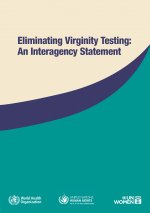
Eliminating Virginity Testing: An Interagency Statement
Omschrijving
Virginity testinga, also referred to as hymen, “two-finger” or per vaginal examination, is an inspection of the female genitalia meant to determine whether a woman or girl has had vaginal intercourse. As shown in a systematic review on virginity testing, the examination has no scientific merit or clinical indication – the appearance of a hymen is not a reliable indication of intercourse and there is no known examination that can prove a history of vaginal intercourse (1). Furthermore, the practice is a violation of the victim’s human rights and is associated with both immediate and long-term consequences that are detrimental to her physical, psychological and social well-being (1). The harmful practice of virginity testing is a social, cultural and political issue, and its elimination will require a comprehensive societal response supported by the public health community and health professionals.
Traditionally, the virginity examination is performed on unmarried women and girls, often under force, threat or coercion, to assess their virtue, honour or social value (2). In numerous countries, it is also included as part of the medical assessment of rape (3). The practice of virginity testing has been reported in countries from several regions of the world. It appears to be most established in Asia and the Middle East; countries in northern and southern Africa; and, more recently, among some immigrant groups in Europe and North America, forcing communities, societies and countries to make decisions regarding its use (3–20). The growing attention to eliminating sexual violence has raised awareness of the routine use of virginity testing in some settings (21).
Virginity testing is rooted in entrenched systems of discrimination against women and girls (i.e. gender discrimination). It further reinforces socio-cultural norms that perpetuate women’s inequality, including stereotyped views of female morality and sexuality, and serves to exercise control over women and girls. Virginity testing violates well-established human rights (22), such as the right to be protected from discrimination based on sex; the right to life, liberty and security of person [including physical integrity]; the right to the highest attainable standard of health; and the rights of the child (when performed on a girl aged under 18 years).
The virginity examination itself can be painful, humiliating and traumatic. It is associated with a range of physical, mental and sexual and reproductive health problems (1, 2, 3, 8, 16). In extreme cases, women or girls may attempt suicide or be killed in the name of “honour” (10, 16, 23). Effects on an individual’s social well-being can also be devastating; women and girls may be ostracized, stigmatized and denied employment and educational opportunities (24, 25). Those who seek redress after virginity testing often face re-stigmatization and retribution. When done in the context of examination for sexual assault, it can lead to re-victimization and re-traumatization (2, 22)
